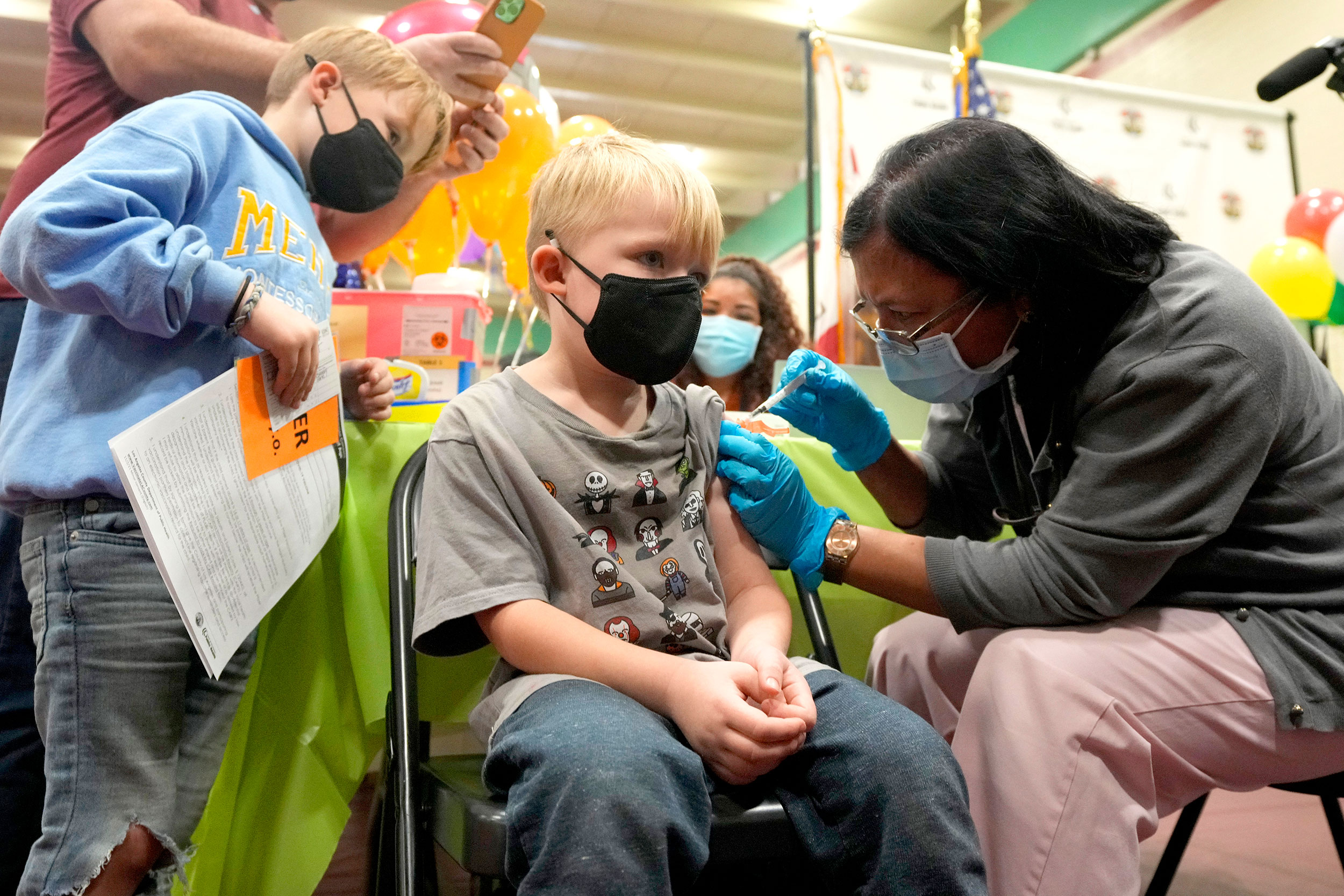
Max Lahoda, 5, receives a COVID-19 vaccine during an event kicking off coronavirus vaccinations for children ages 5-11 at Eugene A. Obregon Park in Los Angeles on Nov. 3.
Keith Birmingham/The Orange County Register via AP
Wondering about COVID-19 vaccines for kids 5 to 11?
Pediatric infectious diseases expert looks at doses and potential side effects
Last week, the FDA authorized the Pfizer/BioNTech COVID vaccine for children ages 5 to 11. After conducting their own review, the CDC now recommends this vaccine for children in this age range, who can begin receiving their first dose within the week.
While many families have been eagerly awaiting the opportunity for their children to be immunized, others are hesitant. And most parents have questions about how COVID-19 affects younger children, vaccine safety in this age range, and whether the benefits outweigh potential risks. As a pediatric infectious disease specialist, I hear certain questions crop up repeatedly. Here’s what we know so far.
Which COVID vaccines and doses are authorized for children ages 5 to 11?
Pfizer/BioNTech is the first COVID vaccine authorized by the FDA for this age group, based on results from a randomized controlled trial evaluating safety and immune responses. A separate trial launched by Moderna is being considered separately.
In a small number of children, the Pfizer/BioNTech trial compared three doses:
- 30 micrograms (the dose adults receive)
- 20 micrograms
- 10 micrograms
This part of the trial showed that 10 micrograms, the smallest dose, resulted in fewer side effects while still generating robust immune responses similar to responses achieved with higher doses.
In the next part of the trial, more than 2,200 children ages 5 to 11 were randomly assigned to receive either a 10-microgram dose of the vaccine (two-thirds of participants) or a placebo dose (one-third of participants). All received two shots, spaced three weeks apart.
Those given the vaccine had similar immune responses as 16-to-25-year-olds who had received the full-dose series of two shots.
When Pfizer/BioNTech submitted data to the FDA, there were not many cases of symptomatic COVID-19 infections in trial participants. Out of 19 documented cases, most had received the placebo shots. Estimates suggest the efficacy rate of the vaccine is 90 percent. (Efficacy measures how much a vaccine reduces infection in a controlled trial.) Tests confirmed that the Delta viral strain had caused the infections.
What do we know about side effects for children this age?
Most children had no side effects other than pain at the injection site. Those who did have side effects most commonly experienced fatigue, headaches, and/or muscle aches after the second dose rather than the first dose. For example, only 6 percent of children had fever after the second vaccine dose. There were no cases of severe allergic reaction to the vaccine.
What is not yet known?
In very rare instances, the Pfizer/BioNTech COVID-19 vaccine is linked to myocarditis, which is an inflammation of the heart. When this occurs, it is mostly seen in young males following their second dose of an mRNA vaccine (Pfizer/BioNTech or Moderna). Most cases are mild, and children show no signs of long-term injury to the heart.
Among the 5- to-11-year-olds who received the Pfizer vaccine during the trial, there were no cases of myocarditis. However, this side effect is very rare and might not be noted until the number of children receiving the vaccine is much higher. The FDA and Pfizer/BioNTech will continue to closely monitor this age group for any occurrence of this rare side effect.
This is an excerpt from an article that appears on the Harvard Health Publishing website.
Kristin Moffitt is a pediatric infectious diseases doctor and researcher at Boston Children’s Hospital, and an assistant professor of pediatrics at Harvard Medical School.





